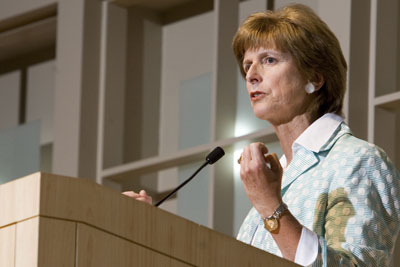Confront climate change by encouraging trading in greenhouse gas credits, says Christine Todd Whitman
By Sara Ball

Global climate change must be addressed without delay, and the best way to do that is to put carbon reduction in the hands of America's private sector.
So said Christine Todd Whitman, former administrator of the Environmental Protection Agency and ex-governor of New Jersey, in a talk on the environment and the economy at Statler Auditorium, April 23.
Despite extensive research and development for energy alternatives, "most technologies are years away from commercial development. But we have to take action now. We can't wait for several years away," Whitman said.
By creating a market system for greenhouse gas savings, private corporations will have the motivation to significantly reduce their emissions, she said. Like the cap and trade system used to mitigate sulfur dioxide in acid rain, a greenhouse gas equivalent would set national emissions targets and allow individuals to figure out how to reach those targets. Organizations that reduced emissions even more could then sell or trade their savings with other organizations. This type of system will be more complicated for greenhouse gases than it was for sulfur dioxide, she said, but it will be effective.
"It worked for acid rain, and it will work for carbon," said Whitman, now president of Whitman Strategy Group, an energy and environmental consulting firm.
When the cap and trade system was implemented for acid rain in the 1990s, nearly all industries in the United States complied. This is also the type of system the European Union is using to reach targets set by the Kyoto Protocol, Whitman said.
Although the U.S. government has been hesitant to take action toward global warming, Whitman believes the political climate in Washington is finally changing. About 30 states have set individual requirements for greenhouse gas reductions, and such legislation has been effective, Whitman noted.
Companies have been pressuring lawmakers to set national emissions standards, possibly due to frustration with the variety of individual states' guidelines, she suggested. About 115 companies -- from Green Mountain Energy to Frito-Lay and Miller Brewing Co. -- have signed on as "climate leaders," helping to reduce carbon emissions equivalent to removing 7 million cars from the roads, Whitman said.
Environmental and economic goals need to viewed as collaborative efforts, Whitman emphasized, because they can create a powerful win-win partnership. "Responsible environmental stewardship can reap benefits for everyone."
"There is no more innovative sector of the world than the American private sector," Whitman said. Environmental prosperity can be achieved if corporations are given the power and motivation to develop strategies toward environmental progress, she said.
The talk, attended by about 300 people, was sponsored by the College of Architecture, Art and Planning and the Lab or Ornithology.
Graduate student Sara Ball is a writer intern with the Cornell Chronicle.
Media Contact
Nicola Pytell
Get Cornell news delivered right to your inbox.
Subscribe